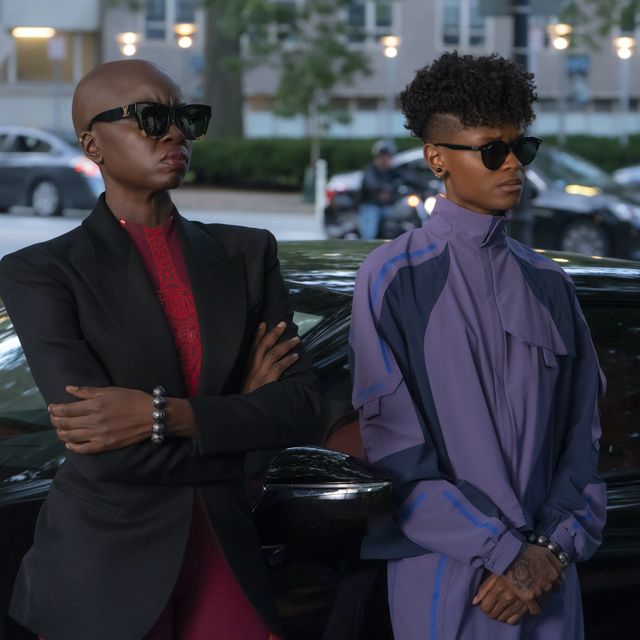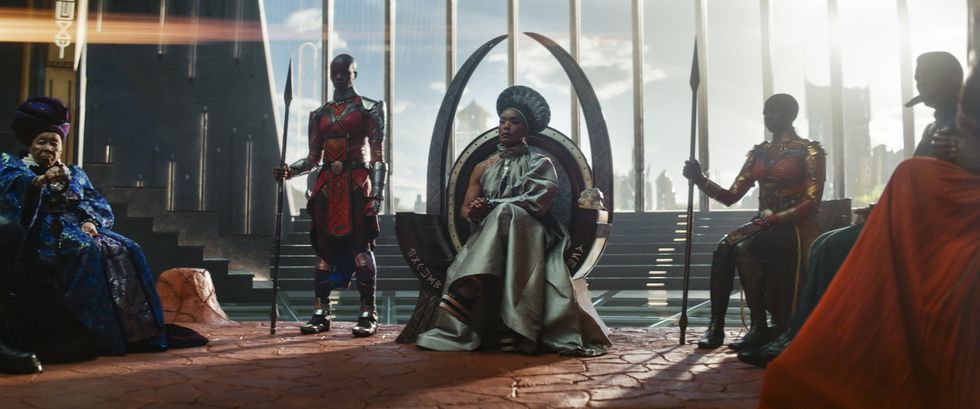Black Panther was a moment as much as it was a movie. The 2018 blockbuster, the first Marvel film to have both a Black director and a predominantly Black cast, was understandably celebrated; it eventually earned over a billion dollars at the box office. It was also the first superhero film to be nominated for Best Picture at the Oscars (though it won in the craft categories, most notably in costume design thanks to Ruth E. Carter’s creations.) There was always going to be pressure for the sequel to match, if not outright beat, its predecessor’s box office and achieve a similar level of critical acclaim. Then, in 2020, the film’s charismatic star, the Black Panther of Black Panther, Chadwick Boseman, died.
The best thing about Black Panther: Wakanda Forever is that it doesn’t shy away from Boseman’s death. It’s the most compelling narrative choice, but not one you might expect from a film with this much riding on it. We open in the middle of tragedy, as his sister Shuri (Letitia Wright, now this franchise’s lead) and mother Ramonda (Angela Bassett) learn of his death. You can tell that everyone here was, and is, still mourning Boseman. Emotions are millimetres below the surface. And while the film is right not to shy away from the real-life loss, it isolates them at the beginning and the end, which is the right choice, for this is a superhero film, so it must fulfil certain conventions.
The plot is based once again around vibranium, the naturally-occurring substance that has helped make Wakanda the most technologically-advanced nation in the world. Other nations have been busy hunting vibranium down outside of Wakanda, thanks to a machine built by student-genius Riri Williams (Dominique Thorne). Namor (a new villain played by Tenoch Huerta) and his underwater army now have their sights set on Riri. As a general rule, no film about the quest for a fictional metallic ore is especially compelling, and this film’s reliance on the material is quite boring.
Good thing there’s plenty of other stuff going on. Huerta’s Namor, a mutant who can swim and fly, makes for a convincing foe. The submerged empire he rules, Talocan, a kind of Atlantis by way of the Aztecs, is a thrilling concept, even if it’s let down by some uninspiring special visuals. Understandably, it’s not given the same generous worldbuilding as Wakanda, though it is harder to get invested in his plight (there are, of course, rumours about Namor’s spin-off, and this film sets him up nicely for that).
The cast is stacked. Bassett is commanding as a monarch who is grieving her son, worrying about her daughter, and protecting her nation. Wright has to do a lot of heavy-lifting as Shura, mourning her brother but also weighing up what she wants to do and what she should do as the ostensible leader of Wakanda. She’s much more convincing in the former mode than the latter. But for the next film, because surely there will be one, it looks like she’ll have some major support in her superhero duties. Michaela Coel is a new entry into this universe, and a welcome face as rebellious soldier Aneka, though her wry presence is mostly flattened by this blockbuster. Lupita N’yongo emerges as the real highlight. The Oscar-winner plays Nakia, the lover of T’Challa, now trying to move on with her life. She’s luminous.
And then you remember: you’re in a superhero movie. Any nuance – the way that Shuri and Namor’s ambitions mirror one another – is lost as soon it descends into the typical Marvel fight scenes; impossible to follow, ruinous of any stakes. The final battle is too long, too grey, too boring for such a film. Humour is an even rarer thing in these features, and while some references will elicit laughter – crowd-pleasing references to the Fenty make-up line, the sight of Martin Freeman in handcuffs – nothing is really funny. There’s also a lot of scene-setting for future franchises and spin-offs. Maybe Marvel fans find this entertaining; I can’t imagine they mean very much to the average movie-goer.
It’s glorious to think how this cast might exist outside of a superhero movie; there’s so much potential to be mined here. But the way that the two films – one exploring grief, one showcasing CGI showdowns – fit together make for an uneven ride. There’s an argument, perhaps, that this mirrors the tumultuous journey of grief, but it doesn’t feel intentional. Still, those closing scenes are pretty undeniable; a sparkling, screen-bursting beachside conversation between Nyong’o and Wright provide respite from the preceding action and more importantly, catharsis following Boseman’s death. It’s a shame there’s so much to wade through before that.
Black Panther: Wakanda Forever premieres in cinemas on 11 November
Henry Wong is a senior culture writer at Esquire, working across digital and print. He covers film, television, books, and art for the magazine, and also writes profiles.















